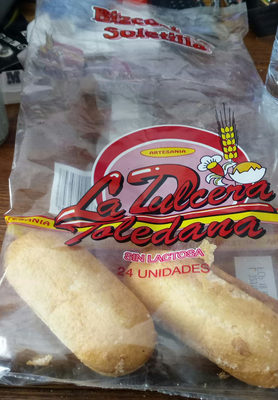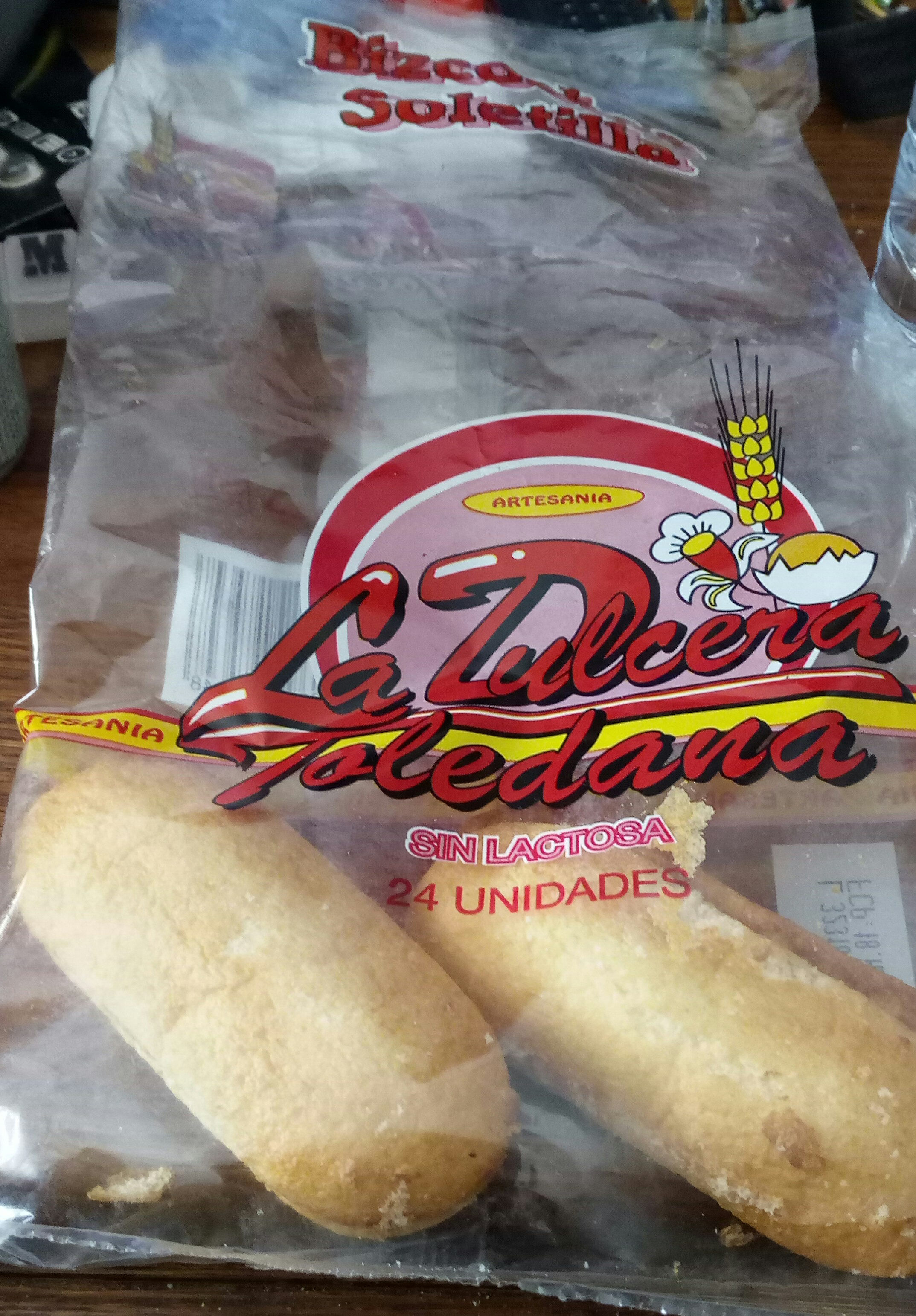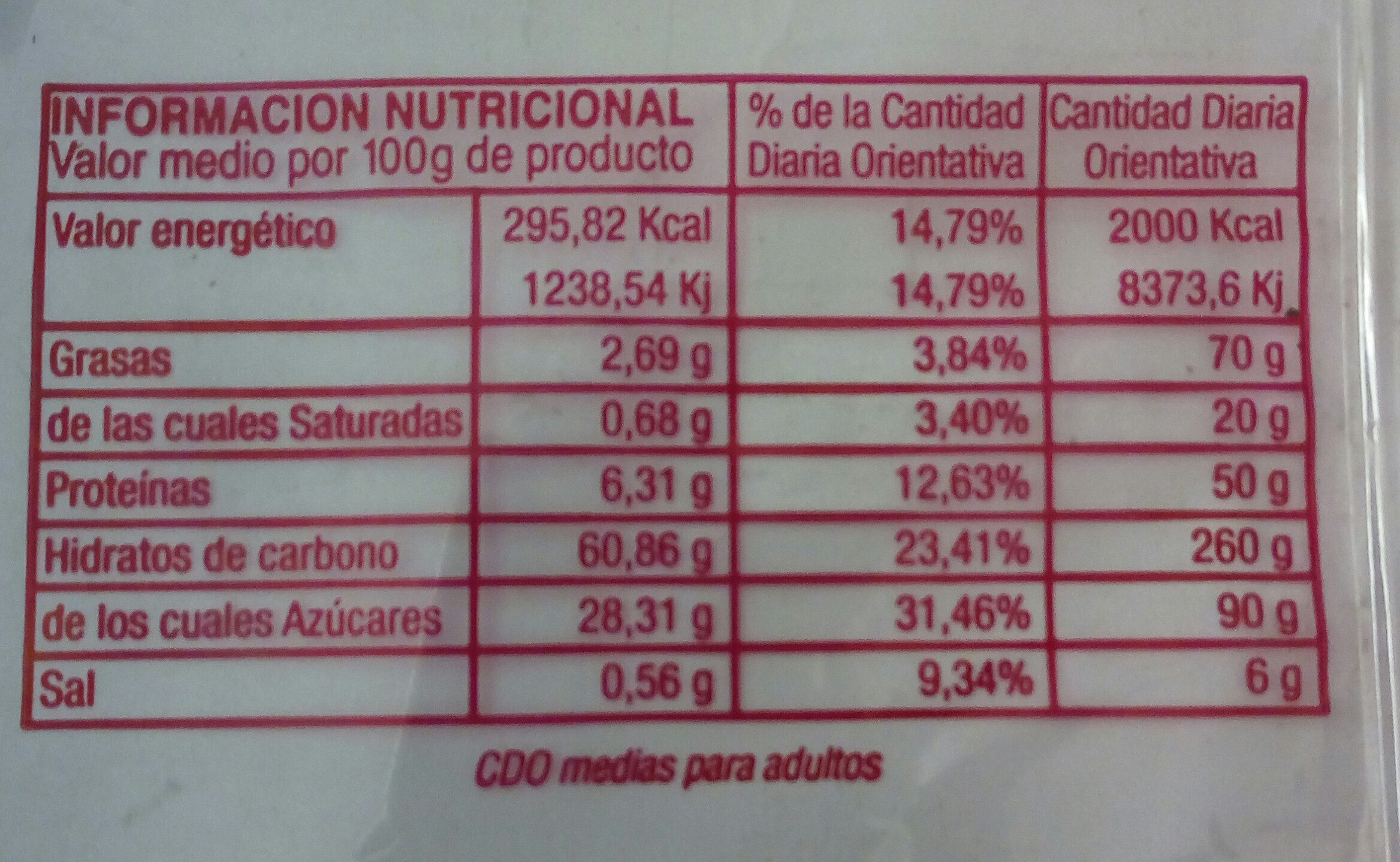Help us make food transparency the norm!
As a non-profit organization, we depend on your donations to continue informing consumers around the world about what they eat.
The food revolution starts with you!
Bizcochos soletilla - La Dulcera Toledana - 24 ud peso neto 230gr
Bizcochos soletilla - La Dulcera Toledana - 24 ud peso neto 230gr
This product page is not complete. You can help to complete it by editing it and adding more data from the photos we have, or by taking more photos using the app for Android or iPhone/iPad. Thank you!
×
Barcode: 8412698185648 (EAN / EAN-13)
Quantity: 24 ud peso neto 230gr
Packaging: es:Bolsa de plastico pp
Brands: La Dulcera Toledana
Categories: Snacks, Sweet snacks, Biscuits and cakes, Biscuits
Labels, certifications, awards: No lactose
Origin of ingredients: es:No consta
Manufacturing or processing places: la mata toledo
Countries where sold: Spain
Matching with your preferences
Health
Ingredients
-
16 ingredients
: Harina de trigo, azucares, huevo, E-500, E-503i), aroma de vainilla, aroma de naranja, aqua, humectante (E-420i), gasificantes (E-501i, conservadores (E-200, E-202, E-281)Allergens: Eggs, Gluten
Food processing
-
Ultra processed foods
Elements that indicate the product is in the 4 - Ultra processed food and drink products group:
- Additive: E420 - Sorbitol
- Ingredient: Flavouring
- Ingredient: Humectant
Food products are classified into 4 groups according to their degree of processing:
- Unprocessed or minimally processed foods
- Processed culinary ingredients
- Processed foods
- Ultra processed foods
The determination of the group is based on the category of the product and on the ingredients it contains.
Additives
-
E200 - Sorbic acid
Sorbic acid: Sorbic acid, or 2‚4-hexadienoic acid, is a natural organic compound used as a food preservative. It has the chemical formula CH3-CH-4CO2H. It is a colourless solid that is slightly soluble in water and sublimes readily. It was first isolated from the unripe berries of the Sorbus aucuparia -rowan tree-, hence its name.Source: Wikipedia
-
E202 - Potassium sorbate
Potassium sorbate (E202) is a synthetic food preservative commonly used to extend the shelf life of various food products.
It works by inhibiting the growth of molds, yeast, and some bacteria, preventing spoilage. When added to foods, it helps maintain their freshness and quality.
Some studies have shown that when combined with nitrites, potassium sorbate have genotoxic activity in vitro. However, potassium sorbate is generally recognized as safe (GRAS) by regulatory authorities.
-
E281 - Sodium propionate
Sodium propionate: Sodium propanoate or sodium propionate is the sodium salt of propionic acid which has the chemical formula Na-C2H5COO-. This white crystalline solid is deliquescent in moist air.Source: Wikipedia
-
E420 - Sorbitol
Sorbitol: Sorbitol --, less commonly known as glucitol --, is a sugar alcohol with a sweet taste which the human body metabolizes slowly. It can be obtained by reduction of glucose, which changes the aldehyde group to a hydroxyl group. Most sorbitol is made from corn syrup, but it is also found in nature, for example in apples, pears, peaches, and prunes. It is converted to fructose by sorbitol-6-phosphate 2-dehydrogenase. Sorbitol is an isomer of mannitol, another sugar alcohol; the two differ only in the orientation of the hydroxyl group on carbon 2. While similar, the two sugar alcohols have very different sources in nature, melting points, and uses.Source: Wikipedia
-
E420i - D-sorbitol
Sorbitol: Sorbitol --, less commonly known as glucitol --, is a sugar alcohol with a sweet taste which the human body metabolizes slowly. It can be obtained by reduction of glucose, which changes the aldehyde group to a hydroxyl group. Most sorbitol is made from corn syrup, but it is also found in nature, for example in apples, pears, peaches, and prunes. It is converted to fructose by sorbitol-6-phosphate 2-dehydrogenase. Sorbitol is an isomer of mannitol, another sugar alcohol; the two differ only in the orientation of the hydroxyl group on carbon 2. While similar, the two sugar alcohols have very different sources in nature, melting points, and uses.Source: Wikipedia
-
E500 - Sodium carbonates
Sodium carbonates (E500) are compounds commonly used in food preparation as leavening agents, helping baked goods rise by releasing carbon dioxide when they interact with acids.
Often found in baking soda, they regulate the pH of food, preventing it from becoming too acidic or too alkaline. In the culinary world, sodium carbonates can also enhance the texture and structure of foods, such as noodles, by modifying the gluten network.
Generally recognized as safe, sodium carbonates are non-toxic when consumed in typical amounts found in food.
-
E501 - Potassium carbonates
Potassium carbonate: Potassium carbonate -K2CO3- is a white salt, which is soluble in water -insoluble in ethanol- and forms a strongly alkaline solution. It can be made as the product of potassium hydroxide's absorbent reaction with carbon dioxide. It is deliquescent, often appearing a damp or wet solid. Potassium carbonate is used in the production of soap and glass.Source: Wikipedia
-
E501i - Potassium carbonate
Potassium carbonate: Potassium carbonate -K2CO3- is a white salt, which is soluble in water -insoluble in ethanol- and forms a strongly alkaline solution. It can be made as the product of potassium hydroxide's absorbent reaction with carbon dioxide. It is deliquescent, often appearing a damp or wet solid. Potassium carbonate is used in the production of soap and glass.Source: Wikipedia
-
E503 - Ammonium carbonates
Ammonium carbonate: Ammonium carbonate is a salt with the chemical formula -NH4-2CO3. Since it readily degrades to gaseous ammonia and carbon dioxide upon heating, it is used as a leavening agent and also as smelling salt. It is also known as baker's ammonia and was a predecessor to the more modern leavening agents baking soda and baking powder. It is a component of what was formerly known as sal volatile and salt of hartshorn.Source: Wikipedia
-
E503i - Ammonium carbonate
Ammonium carbonate: Ammonium carbonate is a salt with the chemical formula -NH4-2CO3. Since it readily degrades to gaseous ammonia and carbon dioxide upon heating, it is used as a leavening agent and also as smelling salt. It is also known as baker's ammonia and was a predecessor to the more modern leavening agents baking soda and baking powder. It is a component of what was formerly known as sal volatile and salt of hartshorn.Source: Wikipedia
Ingredients analysis
-
Palm oil free
No ingredients containing palm oil detected
-
Non-vegan
Non-vegan ingredients: Egg
-
Maybe vegetarian
Ingredients that may not be vegetarian: Vanilla flavouring, Orange flavouring
-
Details of the analysis of the ingredients
: Harina de trigo, azucares, huevo, e500, e503i, aroma de vainilla, aroma de naranja, aqua, humectante (e420i), gasificantes, e501i, conservadores (e200, e202, e281)- Harina de trigo -> en:wheat-flour - vegan: yes - vegetarian: yes - ciqual_proxy_food_code: 9410 - percent_min: 8.33333333333333 - percent_max: 100
- azucares -> en:sugar - vegan: yes - vegetarian: yes - ciqual_proxy_food_code: 31016 - percent_min: 0 - percent_max: 28.31
- huevo -> en:egg - vegan: no - vegetarian: yes - ciqual_food_code: 22000 - percent_min: 0 - percent_max: 28.31
- e500 -> en:e500 - vegan: yes - vegetarian: yes - percent_min: 0 - percent_max: 25
- e503i -> en:e503i - vegan: yes - vegetarian: yes - percent_min: 0 - percent_max: 20
- aroma de vainilla -> en:vanilla-flavouring - vegan: maybe - vegetarian: maybe - percent_min: 0 - percent_max: 5
- aroma de naranja -> en:orange-flavouring - vegan: maybe - vegetarian: maybe - percent_min: 0 - percent_max: 5
- aqua -> en:water - vegan: yes - vegetarian: yes - ciqual_food_code: 18066 - percent_min: 0 - percent_max: 5
- humectante -> en:humectant - percent_min: 0 - percent_max: 5
- e420i -> en:e420i - vegan: yes - vegetarian: yes - percent_min: 0 - percent_max: 5
- gasificantes -> en:raising-agent - percent_min: 0 - percent_max: 5
- e501i -> en:e501i - vegan: yes - vegetarian: yes - percent_min: 0 - percent_max: 5
- conservadores -> en:preservative - percent_min: 0 - percent_max: 5
- e200 -> en:e200 - vegan: yes - vegetarian: yes - percent_min: 0 - percent_max: 5
- e202 -> en:e202 - vegan: yes - vegetarian: yes - percent_min: 0 - percent_max: 2.5
- e281 -> en:e281 - vegan: yes - vegetarian: yes - percent_min: 0 - percent_max: 1.66666666666667
Nutrition
-
Poor nutritional quality
⚠ ️Warning: the amount of fiber is not specified, their possible positive contribution to the grade could not be taken into account.⚠ ️Warning: the amount of fruits, vegetables and nuts is not specified on the label, it was estimated from the list of ingredients: 0This product is not considered a beverage for the calculation of the Nutri-Score.
Positive points: 0
- Proteins: 3 / 5 (value: 6.31, rounded value: 6.31)
- Fiber: 0 / 5 (value: 0, rounded value: 0)
- Fruits, vegetables, nuts, and colza/walnut/olive oils: 0 / 5 (value: 0, rounded value: 0)
Negative points: 11
- Energy: 3 / 10 (value: 1234, rounded value: 1234)
- Sugars: 6 / 10 (value: 28.31, rounded value: 28.31)
- Saturated fat: 0 / 10 (value: 0.68, rounded value: 0.7)
- Sodium: 2 / 10 (value: 224, rounded value: 224)
The points for proteins are not counted because the negative points are greater or equal to 11.
Nutritional score: (11 - 0)
Nutri-Score:
-
Nutrient levels
-
Fat in low quantity (2.69%)
What you need to know- A high consumption of fat, especially saturated fats, can raise cholesterol, which increases the risk of heart diseases.
Recommendation: Limit the consumption of fat and saturated fat- Choose products with lower fat and saturated fat content.
-
Saturated fat in low quantity (0.68%)
What you need to know- A high consumption of fat, especially saturated fats, can raise cholesterol, which increases the risk of heart diseases.
Recommendation: Limit the consumption of fat and saturated fat- Choose products with lower fat and saturated fat content.
-
Sugars in high quantity (28.3%)
What you need to know- A high consumption of sugar can cause weight gain and tooth decay. It also augments the risk of type 2 diabetes and cardio-vascular diseases.
Recommendation: Limit the consumption of sugar and sugary drinks- Sugary drinks (such as sodas, fruit beverages, and fruit juices and nectars) should be limited as much as possible (no more than 1 glass a day).
- Choose products with lower sugar content and reduce the consumption of products with added sugars.
-
Salt in moderate quantity (0.56%)
What you need to know- A high consumption of salt (or sodium) can cause raised blood pressure, which can increase the risk of heart disease and stroke.
- Many people who have high blood pressure do not know it, as there are often no symptoms.
- Most people consume too much salt (on average 9 to 12 grams per day), around twice the recommended maximum level of intake.
Recommendation: Limit the consumption of salt and salted food- Reduce the quantity of salt used when cooking, and don't salt again at the table.
- Limit the consumption of salty snacks and choose products with lower salt content.
-
-
Nutrition facts
Nutrition facts As sold
for 100 g / 100 mlAs sold
per serving (9.8g)Compared to: Biscuits Energy 1,234 kj
(295 kcal)121 kj
(28 kcal)-37% Fat 2.69 g 0.264 g -87% Saturated fat 0.68 g 0.067 g -93% Carbohydrates 60.86 g 5.96 g -5% Sugars 28.31 g 2.77 g -2% Fiber ? ? Proteins 6.31 g 0.618 g +1% Salt 0.56 g 0.055 g -8% Fruits‚ vegetables‚ nuts and rapeseed‚ walnut and olive oils (estimate from ingredients list analysis) 0 % 0 %
Environment
-
Eco-Score C - Moderate environmental impact
⚠ ️Select a country in order to include the full impact of transportation.The Eco-Score is an experimental score that summarizes the environmental impacts of food products.→ The Eco-Score was initially developped for France and it is being extended to other European countries. The Eco-Score formula is subject to change as it is regularly improved to make it more precise and better suited to each country.Life cycle analysis
-
Average impact of products of the same category: B (Score: 69/100)
Category: Biscuit (cookie)
Category: Biscuit (cookie)
- PEF environmental score: 0.35 (the lower the score, the lower the impact)
- including impact on climate change: 2.88 kg CO2 eq/kg of product
Stage Impact Agriculture
80.5 %Processing
11.8 %Packaging
3.1 %Transportation
3.2 %Distribution
1.4 %Consumption
0.0 %
Bonuses and maluses
-
Missing origins of ingredients information
Malus: -5
⚠ ️ The origins of the ingredients of this product are not indicated.
If they are indicated on the packaging, you can modify the product sheet and add them.
If you are the manufacturer of this product, you can send us the information with our free platform for producers.
-
Packaging with a medium impact
Malus: -8
Shape Material Recycling Impact Bag PP 5 - Polypropylene High
Eco-Score for this product
-
Impact for this product: C (Score: 56/100)
Product: Bizcochos soletilla - La Dulcera Toledana - 24 ud peso neto 230gr
Life cycle analysis score: 69
Sum of bonuses and maluses: -13
Final score: 56/100
-
Carbon footprint
-
Equal to driving 1.5 km in a petrol car
288 g CO² per 100g of product
The carbon emission figure comes from ADEME's Agribalyse database, for the category: Biscuit (cookie) (Source: ADEME Agribalyse Database)
Stage Impact Agriculture
82.9 %Processing
7.9 %Packaging
3.8 %Transportation
4.7 %Distribution
0.7 %Consumption
0.0 %
Packaging
-
Packaging with a medium impact
-
Packaging parts
Bag (PP 5 - Polypropylene)
-
Packaging materials
Material % Packaging weight Packaging weight per 100 g of product Plastic
-
Transportation
-
Origins of ingredients
Missing origins of ingredients information
⚠ ️ The origins of the ingredients of this product are not indicated.
If they are indicated on the packaging, you can modify the product sheet and add them.
If you are the manufacturer of this product, you can send us the information with our free platform for producers.Add the origins of ingredients for this product Add the origins of ingredients for this product
Report a problem
-
Incomplete or incorrect information?
Category, labels, ingredients, allergens, nutritional information, photos etc.
If the information does not match the information on the packaging, please complete or correct it. Open Food Facts is a collaborative database, and every contribution is useful for all.
Data sources
Product added on by openfoodfacts-contributors
Last edit of product page on by roboto-app.
Product page also edited by acuario, kiliweb, musarana, packbot, thaialagata, yuka.WHJJT1NxWWlnTkFQaXZBVDFSYmx3OGh4d3JPU1lWMlhGUG9ZSVE9PQ.











